|
1.
CENTRAL AND WEST AFRICA
Recent demand trends
Producers report continued steady demand in all major
markets but are expressing concerns on the possible
impact of the coming into force of the EUDR.
Prices for the EU market remain stable with no significant
changes reported but competition is fierce, especially
between shippers in Cameroon and Congo and this is
affecting the dynamics in the sawnwood market. The flow
of padouk from Cameroon, Congo and the Central African
Republic (RCA) continues and there are reports of an
increase in doussie and sapelli offers.
In France demand for logs is quiet due to the closure of
some sawmills that processed tropical logs. Sawnwood
prices are stable but strict enforcement of the current
EUTR has driven exporters to explore markets outside
Europe.
Demand in Spain for sapelli and small volums of tali has
been observed while buyers in Portugal have shown
interest in iroko, niangon and sometimes sapelli.
No major shifts in demand in Middle East markets have
been reported. However, there has been a slight increase in
demand for okoume. In the Middle East the increasing
utilisation of lower quality okoume for domestic market
applications (such as pallets) has been noted.
The Philippines recently suffered severe damage from a
typhoon and this has lifted demand for timber for
reconstruction. Producers have noted the return of buyers
for the Vietnamese market, particularly for tali in
preference over azobe or okan.
Harvesting conditions
With the rain season approaching operators in Cameroon
are increasing log stocks to ensure a continuous supply
during bad weather. In the Congo and Gabon operators are
awaiting the onset of the dry period, expected soon.
In North Congo the rains are subsiding improving
conditions for harvesting and transporting timber to
Douala Port which is logistically closer than Pointe Noire
for northern operations.
Transportation Issues
Transportation continues to be a challenge in Gabon due to
the ongoing repairs to all-weather laterite roads and
damaged bush roads. Some shippers have report the
railway operator has difficulties in allocating wagons for
sawnwood.
It has been reported there is a study underway for a second
rail track from Koulamoutou to Mayumba on the coast,
potentially leading to the development of a deepwater port.
This project has attracted interest from Australian and
Chinese investors due to the high-grade iron and gold
reserves in the Belinga Mountains.
Youth technical training
The government in Gabon is encouraging youth to pursue
technical education, particularly in timber-related
disciplines. A special unit in the Nkok special zone has
been established focusing on training in forestry, milling
and the operation of trucks and heavy machinery.
Electricity disruptions are severely affecting the peeling
and plywood industries, with operations within the Gabon
Special Economic Zone (GSEZ) being particularly
disturbed. The local water and electricity supplier, SEEG,
has promised an improvement by the end of the month.
Harmonising traceability and legality systems
Representatives from the forestry sector in Gabon met
recently to discuss issues related to the traceability of
timber harvested in Gabon and explore opportunities for
synergies between the traceability and e-governance
systems currently being deployed and the possibilities for
sharing data with the timber promotion platform “Open
Timber Portal”.
The gathering was arranged by the World Resources
Institute (WRI) and Global Forest Environment
Consulting (GFEC) to bring together private economic
operators as well as senior representatives of the Forestry
Administration.
See:
https://www.gabonreview.com/exploitation-forestiere-au-gabon-les-acteurs-du-secteur-harmonisent-leurs-systemes-de-tracabilite-et-de-legalite/
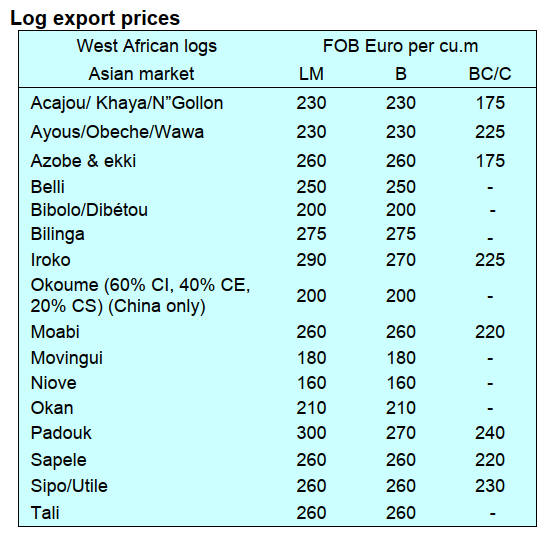
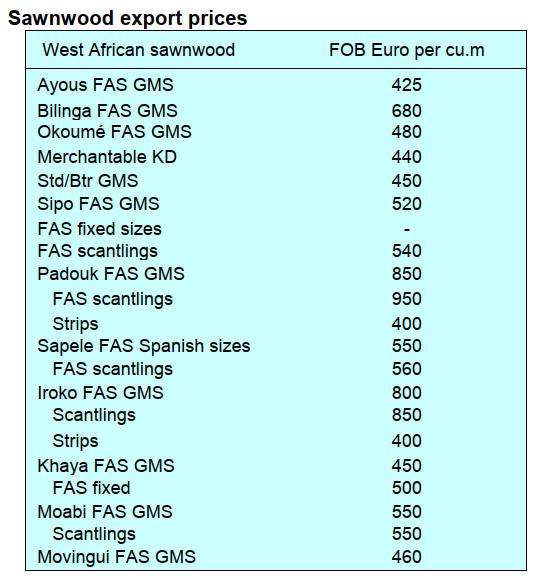
2.
GHANA
Prices to ECOWAS rise despite drop in volume
In the first two months of 2024 Ghana’s wood product
exports to six ECOWAS (Economic Community of West
African States) countries amounted to 3,480 cu.m of the
country’s total volume of 40,763 cu.m. This represented
9% less when compared to 3,824 cu.m recorded for the
same countries during the same period in 2023 when total
exports were 44,400 cu.m.
However, earnings from wood product exports to the
ECOWAS market in the first two months of 2024
registered a marginal increase to Eur 1,398,648, from
Eur 1,397,761 in 2023.
The average unit price (AUP) for shipment to all countries
increased from Eur366/cu.m in 2023 to Eur402/cu.m in
2024. In particular the average price for exports to
Burkino Faso in the first two months of 2024 was 34%
higher than in the same period in 2023. However, average
prices for shipments to Niger and Benin were down year
on year.
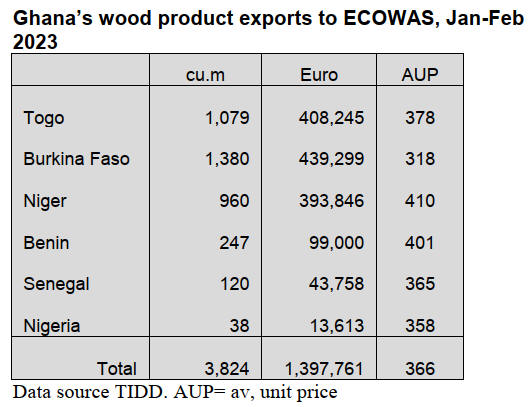
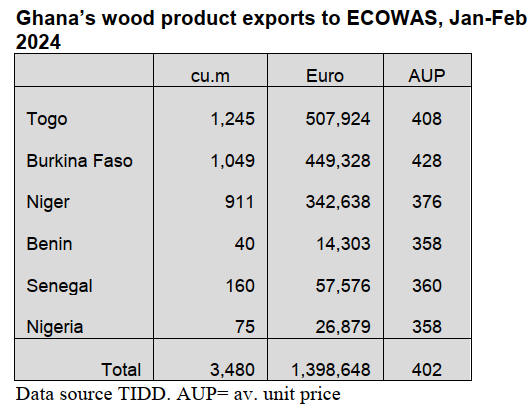
Wood products exported to the Africa regional markets
included air-dried sawnwood, plywood, kiln-dried
sawnwood and sliced veneer. Morocco, South Africa and
Egypt were also Ghana’s non-ECOWAS trading partners
in early 2024.
Plywood was one of the major wood products exported to
the ECOWAS sub-regional market, especially to Togo,
Burkina Faso and Niger and amounted to 3,072cu.m in the
first two months of 2024. Shipments to Nigeria (75 cu.m),
Benin (40 cu.m) and Senegal (161 cu.m) made up most of
the balance of shipments.
ECOWAS Bank to inject U$200m to support Ghana
SMEs
The ECOWAS Bank for Investment and Development
(EBID) has strengthened its transformative partnership
with Ghana by committing to inject US$200 million into
the Ghanaian economy through strategic alliances with the
Ghana Export-Import Bank (GEXIM) and GCB Bank
PLC.
This was contained in a Memorandum of Understanding
signed by Dr. George Agyekum Donkor, President and
Chairman of the Board of Directors of EBID and Dr.
Mohammed Amin Adam, Minister for Finance of the
Republic of Ghana, at a ceremony held at the EBID
headquarters in Lome, Togo.
The financing will support small and medium enterprises
and other critical sectors of the economy as part of
government’s commitment to fund SME operations at
reduced loan interest rates. The latest finance brings to
US$600 million EBID’s commitment to Ghana.
In related news, the Development Bank Ghana (DBG) and
Singaporean FinTech firm, Proxtera, have also partnered
to provide small and medium-sized enterprises in the
country loans worth some US$100 mil. This was
contained in a Memorandum of Understanding (MoU)
signed between DBG and Proxtera on the sidelines of the
3i Africa Summit in Accra.
See:
https://www.dbg.com.gh/2024/05/20/
Ghana losing billions to environmental degradation
The Executive Director of the Environmental Protection
Agency (EPA), Dr. Kingsley Krugu, has suggested that an
economic assessment on the cost of environmental
degradation in Ghana would likely show the country is
losing billions annually.
Dr. Krugu made these revelations at a ceremony to
commemorate this year’s World Biodiversity Day (WBD)
in Accra on the theme ‘Be Part of The Plan’ fashioned to
remind everyone of their responsibility towards the
environment as provided under Article 41 (k) of the 1992
Constitution of the Republic of Ghana.
He said, unregulated activities such as illegal mining,
pollution with mercury, degradation of costal habitats,
deforestation and forest degradation, along with climate
change are causing the country huge economic loses
annually.
See:
https://gna.org.gh/2024/05/ghana-loses-usd-54billion-annually-to-environmental-degradation-epa/
and
https://citibusinessnews.com/2016/12/ghana-loses-54-billion-to-galamsey-deforestation-group/
Higher producer price inflation
April Producer Price Inflation (PPI) for all goods and
services in the country for April 2024 was 17%, up from
the 15% recorded in March 2024 according to the Ghana
Statistical Service (GSS).
The month-on-month PPI, also known as the ex-factory
price was 4% in April 2024, higher than the 3.2% recorded
in March 2024.
The report stated that, the producer price inflation in the
industrial sector, excluding the construction sector,
increased to 20% in April 2024 from 19% recorded in
March 2024. In the Services sector the rate increased from
7.6% in March 2024 to 9.4% in April 2024.
In related news, at a news conference after the Monetary
Policy Committee (MPC) meeting the Governor of the
Bank of Ghana (BoG), Dr. Ernest Addison, announced
that the Bank would maintain its Monetary Policy Rate
(MPR) at 29%. He said projections indicate that inflation
would remain within the monetary policy consultation
clause of 13 to 17% by the end of the year.
See:
https://statsghana.gov.gh/gssmain/storage/img/marqueeupdater/April_PPI_All%20activities%20(summary).pdf
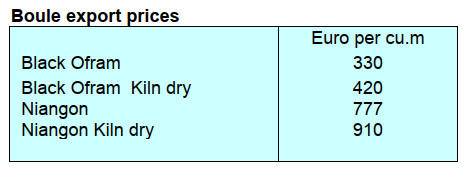
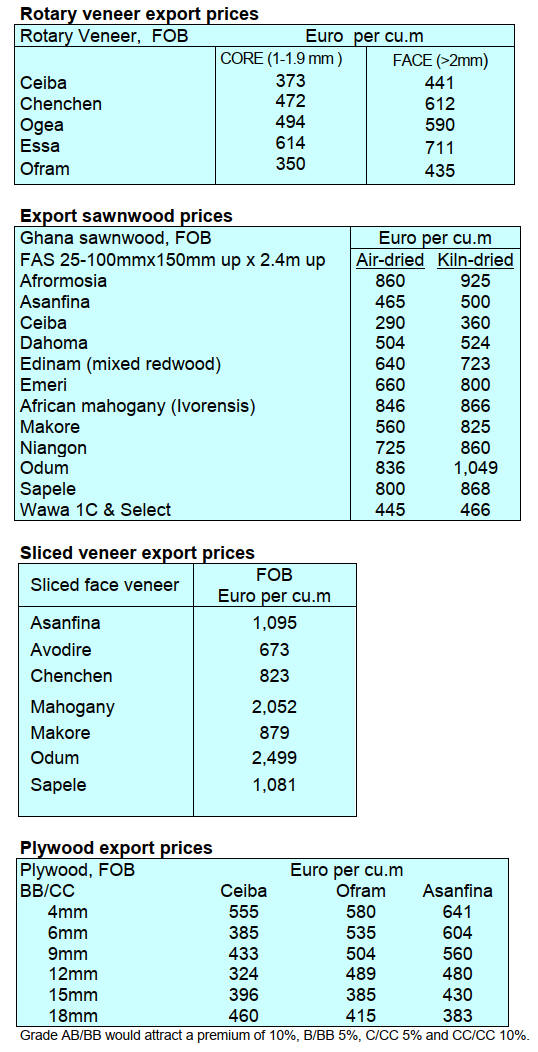
3. MALAYSIA
Strong trade performance
Malaysia’s trade continued its strong performance and
maintained an upward growth in April 2024 recording
double-digit growth of 12%t compared to April 2023. This
was the fourth consecutive month of year-on-year
expansion.
Exports in April 2024 rebounded by 9% year on year after
two consecutive months of contraction, according to the
Ministry of Investment, Trade and Industry. In terms of
markets, exports to ASEAN, the United States and the
European Union recorded double-digit growth while
exports to China rebounded from negative growth
recorded in the previous month.
See:
https://www.malaymail.com/news/money/2024/05/20/miti-malaysia-trade-up-121pc-to-rm22174b-exports-rebound-91pc-to-rm11472b-in-april/135445
EFE furniture fair
The Export Furniture Exhibition (EFE) returned to the
Kuala Lumpur Convention Centre (KLCC) for its 17th
edition attracting exhibitors and buyers from all over the
world. EFE 2024 was described by the show’s organiser as
“a resounding success”.
This year’s show saw the return of the Malaysian
Furniture Creativity (MFC) Awards, a scheme designed to
applaud innovation and inspire the future of furniture
design and to motivate manufacturers to embrace Original
Design Manufacturing as a consequence.
Three categories, dining, living and bedroom furniture
were assessed and the final results were decided through a
combination of voting from invited buyers as well as
evaluation from a panel of judges comprising professional
designers and media personnel. The winners are reported
in the link below. The 18th EFE will take place 3-6 March
2025 at the KLCC.
See:
https://furniturenews.net/event-review/winning-exports-from-malaysias-efe
Sabah forest carbon auction
Bursa Carbon Exchange (BCX), a wholly-owned
subsidiary of Bursa Malaysia Berhad (Malaysia Stock
Exchange), will be hosting an auction of its first
Malaysian carbon credits in July.
The auction of carbon credits from the Kuamut Rainforest
Conservation Project (Kuamut Project) in Sabah marks a
significant milestone for BCX on several fronts.
According to Muhamad Umar Swift, Chief Executive
officer of Bursa Malaysia, “This is a historic moment as
we welcome the first Malaysian nature-based carbon
project onto BCX. Given the importance of the voluntary
carbon market (VCM) in the nation’s climate agenda, the
offering of the Kuamut Project carbon credits is a
significant milestone, indicating the country’s
environmental leadership”.
Muhamad Umar Swift hopes that this historic moment
signals to the world that Malaysia is serious about climate
action and its climate ambition. He said “We are
committed to advance the transition towards a lower
carbon economy by developing a supportive VCM
ecosystem through BCX.”
The Kuamut Project currently contributes towards 12 of
the 17 goals and targets under the UN Sustainable
Development Cooperation Framework in addition to
verifiable emissions reduction.
See:
https://www.theborneopost.com/2024/05/11/bursa-malaysia-to-auction-carbon-credits-from-kuamut-rainforest-conservation-project/
Mandatory environmental compliance
The Sarawak Timber Association (STA) will pioneer
initiatives aimed at enhancing environmental stewardship
in the forestry sector in conjunction with the upcoming
implementation of mandatory Environmental Compliance
Audit (ECA), effective July 1 this year.
STA said it has consistently encouraged members in the
forestry sector to uphold environmental regulations,
particularly the Natural Resources and Environment
(Audit) Rules 2008 as administered by Natural Resources
and Environment Board (NREB).
As part of its ongoing commitment to improving
environmental stewardship, STA has been conducting a
series of comprehensive Environmental Quality
Monitoring (EQM) and ECA training sessions since 2015.
Individuals aspiring to become registered Environmental
Auditors are required to fulfil the prerequisite of
successfully completing the ECA training course and
registering with NREB.
The ECA training course covers various audit
methodologies and techniques essential for assessing
environmental compliance. Participants will gain
proficiency in understanding the audit scope and processes
involved as well as in planning and conducting on-site
audits.
See:
http://theborneopost.pressreader.com/article/281590950668873
4.
INDONESIA
IDR 7.5 billion for restructuring wood
processing
industries
The Ministry of Industry has allocated IDR7.5 billion for a
programme to assist in the upgrading of machinery and
equipment in the wood and furniture processing industries.
The Ministry of Industry aims to assist at least 10
companies needing production equipment upgrading. Putu
Juli Ardika, Director General of Agro-Industry at the
Ministry of Industry, explained that the programme aims
to strengthen the value chain for processed wood and
furniture by optimising technological aspects. He added
"in addition, this can enhance the competitiveness and
efficiency of wood processing and furniture production”.
Since 2022, 24 wood and furniture processing companies
have participated in this programme and recipient
companies say the programme increased company
efficiency by 10-30%, product quality by 10-30% and
company productivity by 20-30% according to the
Ministry.
See:
https://www.siaranindonesia.com/baca/20240513/anggaran-program-restrukturisasi-mesin-industri-furniture-rp75-miliar.html
Monitoring using remote sensing requires ground
verification
Ensuring precision in forest monitoring requires attention
to detailed parameters and ground checks stated Alue
Dohong, Deputy Minister of Environment and Forestry
(KLHK)at the 19th UNFF side vent ‘Robust Forest
Monitoring System for Assuring Sustainable Forest
Management’.
Acting Director-General of Sustainable Forest
Management at the Ministry of Environment and Forestry,
Agus Justianto, added that forest monitoring using remote
sensing technology requires verification with ground
checks adding no currently available remote technology
can describe forest conditions with precision.
Agus explained that Indonesia utilises remote sensing
technology in monitoring forest resources to support
sustainable forest management at the forest management
level, including the use of high-resolution satellite
imagery.
See:
https://forestinsights.id/indonesia-emphasizes-importance-of-detailed-parameters-and-ground-checks-for-forest-monitoring-accuracy/
Also at the UNFF the KLHK stated that, in recent years,
the national forest monitoring system data revealed that
Indonesia's deforestation level has decreased significantly.
Agus Justianto, KLHK Acting Director General of
Sustainable Forest Management said "through a long
process of improving the forest monitoring system
Indonesia can now show data related to deforestation
trends backed up scientifically.
Justianto elaborated that the net deforestation rate fell by
8.4% between 2021 to 2022, with a reduction in gross
deforestation of 14%.
See:
https://www.suara.com/bisnis/2024/05/10/233755/indonesia-ungkap-keberhasilan-kurangi-deforestasi-aphi-turut-berkontribusi
Progress by Joint Task Force on EUDR
Musdhalifah Machmud, co-chair of the EUDR Joint Task
Force and Senior Advisor for Connectivity, Service Sector
and Natural Resources, Coordinating Ministry for
Economic Affairs for the Republic of Indonesia and
Florika Fink-Hooijer, Director-General for the
Environment, European Commission met in Bali in May
reaffirmed their willingness to ensure uninterrupted trade
flows and enhance deforestation-free supply chains.
The EU welcomed the efforts from Indonesia to include
smallholders in the value chain and both sides agreed to
involve them further in the next steps. Indonesia and the
EU agreed on technical discussions between the
Indonesian authorities and the European Commission’s
Joint Research Centre to share feedback on relevant forest
maps in alignment with the regulation.
Both sides welcomed the forthcoming joint study on the
legality requirements of the EUDR in the Indonesian
context. The study is expected to provide a list of laws and
regulations in force in Indonesia to facilitate operators’
and traders’ due diligence obligations.
See:
https://www.europeaninterest.eu/eu-and-indonesia-cooperate-to-implement-the-eu-deforestation-regulation/
SMEs encouraged to boost exports
Jerry Sambuaga, Deputy Minister of Trade, has
encouraged businesses, including micro, small and
medium enterprises (MSMEs), to make the most of trade
agreements between Indonesia and other countries to boost
exports. One of the trade agreements that can be utilised,
he added, is the Indonesia-Australia Comprehensive
Economic Partnership Agreement (IA-CEPA).
IA-CEPA is a comprehensive economic partnership
agreement between Indonesia and Australia, with one of
the objectives being to expand market access and boost the
competitiveness of Indonesian products, especially
agriculture, fisheries, industry and forestry.
Australia eliminated 6,474 tariff posts so that Indonesian
products are not subject to import duties. This provides an
incentive for exporters, said the Deputy Minister.
See:
https://en.antaranews.com/news/313545/deputy-minister-urges-msmes-to-use-trade-agreements-to-boost-exports?utm_source=antaranews&utm_medium=desktop&utm_campaign=popular_right
Expanding domestic and foreign market share
The Indonesian furniture sector experienced a 24% year-
on-year decline in export earnings in 2023 attributed to
global geopolitical conditions. According to data from
Statistics Indonesia (BPS), exports in 2023 amounted to
US$2.2 billion, down from US$ 2.9 billion in 2022.
Dedy Rochimat, the General Chair of the Indonesian
Furniture Industry and Handicraft Association (Asmindo)
is confident that Indonesia can expand growth in the
furniture sector. This is based on the tremendous potential
that Indonesia possesses along with the ongoing collective
efforts being made.
"Despite the 2023 decline, Asmindo is confident that
Indonesia can capture 1% of the world furniture market
share in the future," said Dedy.
To reach that goal the association is working to expand its
domestic and foreign market share through various
programmes, one of which involves developing the
International Furniture and Craft Fair Indonesia (IFFINA)
Kofurn in Korea, Index Dubai as well as holding the
IFFINA Indonesia Meubel & Design Expo in September
this year.
See:
https://ekonomi.bisnis.com/read/20240522/257/1767635/ekspor-furnitur-ri-amblas-pengusaha-bidik-pasar-global
In related news, the Director General of National
Export
Development, Didi Sumedi, along with the Director
General of International Trade Negotiations, Djatmiko
Bris Witjaksono, met with leading importers in Santiago,
Chile. The purpose of the meeting was to promote an
increase in the exports of Indonesian furniture.
The furniture industry in Chile is growing steadily with an
average projected annual growth of 6% (CAGR 2024–29)
and a projected turnover of US$5.14 billion in 2024.
To capitalise on the potential of the Chilean furniture
market, Director General Didi announced that the Ministry
of Trade will offer support and assistance for Chilean
importers to visit Indonesia, including participation in
furniture exhibitions.
Additionally, importers will have the opportunity to visit
Indonesian furniture companies to source products tailored
to the preferences of the Chilean and South American
markets.
Didi stated that with the implementation of the preferential
tariff scheme under the Indonesia-Chile CEPA Agreement,
Indonesian furniture exports to Chile will continue to rise.
See:
https://www.kemendag.go.id/berita/foto/kemendag-dorong-ekspor-furnitur-indonesia-ke-amerika-selatan
Indonesian model for community-based forest
governance
The World Bank hosted the 2024 Land Conference in
Washington from12-17 May 2024 which focused on social
forestry as a means of supporting land management and
climate resilience.
Director General of Social Forestry and Environmental
Partnerships of the KLHK, Bambang Supriyanto,
discussed the relationship between land, climate and food
security in a conference session. According to Bambang,
in 2016 a more progressive social forestry programme
started with the establishment of the Directorate General
of Social Forestry and Environmental Partnerships under
the KLHK. This programme involves providing access to
state forests for communities in and around the forest.
The target for access is 12.7 million hectares by 2030 and
as of May this year the target of 6.7 million hectares has
been achieved. Bambang stated that another aim of social
forestry is to promote economic equality and increase
family income.
Willem van der Muur, a Land Tenure Specialist at the
World Bank, mentioned that Indonesia has the potential to
serve as a model for community-based forest governance
to achieve climate and food security.
Bambang also presented the findings of the most recent
study on carbon uptake in social forestry areas. Between
2016 and 2021, the forest cover in social forestry areas
increased and contributed to carbon absorption of 32
million tonnes of carbon dioxide equivalent.
This amount is five times higher than the initial target for
carbon absorption set when the programme was first
designed.
See:
https://tekno.tempo.co/read/1869061/perhutanan-sosial-indonesia-jadi-contoh-mitigasi-iklim-berbasis-masyarakat
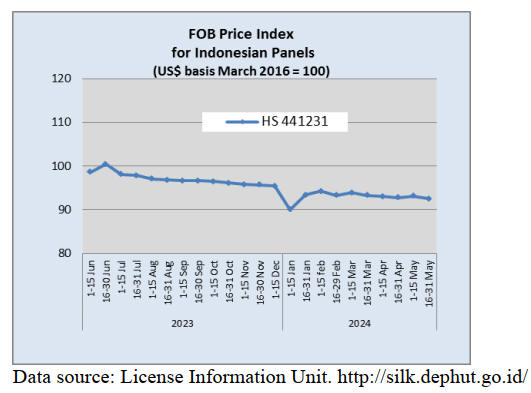
5.
MYANMAR
Forest Joint Venture Corporation AGA
The Forest Joint Venture Corporation held its 31st Annual
General Assembly on 19 May 2024 reviewing
performance for the six months (April to Sept) last year.
The majority shareholder is the Myanma Timber
Enterprise with 45% and the Forest Department holds 10%
bringing to 55% the government’s share.
According to a report to the shareholders the net profit
after tax was about 2,700 million Kyats, approximately
equal to US$700,000 at the prevailing exchange rate.
In order to reduce the dependency on the timber trade the
corporation has tried to adjust its business strategy. One of
the ideas considered was the establishment of a bank
dedicated to the forestry sector. In Myanmar, there are few
banks dedicated to specific sectors.
However, a major obstacle to the establishment of a bank
was that the substaintial foreign exchange holdings of the
Corporation had to be converted into local currency in
2022 when the government ordered trade and non-trade
institutions not to hold foreign currency.
When the conversion was made the exchange rate applied
was 1,850MMK/US$. It is understood that the Corporation
lost financially given that the current exchange rate has
risen from 1,850 MMK to over 4,000 MMK per US dollar.
Revival of Myitsone dam project
The Myanmar government is reportedly contemplating the
revival of the Myitsone hydropower project, an US$3.6
billion China-backed dam in the Kachin state work on
which was halted in 2011 due to environmental concerns
and public protests.
The announcement came via the Information Ministry
which stated a new leadership team has been formed to
reconsider the project involving research, technical
solutions and public relations, in partnership with China's
SPIC Yunnan International Power Investment company.
Opposition to the dam remains strong with concerns over
environmental damage, displacement of villagers and the
imbalance of power distribution with a reported 90% to go
to China .
See-
https://abcnews.go.com/International/wireStory/myanmar-quietly-announces-plans-study-controversial-chinese-dam-110502603
and
https://thediplomat.com/2020/07/chinese-investment-in-myanmar-beyond-myitsone-dam/
Cracked down on unlicensed online money changers
The Central Bank of Myanmar (CBM) has cracked down
on more Facebook pages and websites operating as
unlicensed money exchangers. These businesses lacked
the official permits required to buy, sell and exchange
foreign currency.
The CBM has already taken action against the individuals
and organisations involved. The CBM is also collaborating
with other central banks to target foreign-based operations
that use phone numbers and social media pages for forex
activity. This crackdown has contributed to shortages of
essential goods, especially medicine.
See-
https://elevenmyanmar.com/news/myanmar-central-bank-cracks-down-on-16-more-illegal-foreign-exchange-facebook-pages-and
6.
INDIA
Surging freight rates
disrupting teak trade
The correspondent writes “ocean freight has been going
crazy over the last 20 days with rates almost doubled.
Freight charges to India have increased 3 fold during the
last 4-5 months especially from Africa and South America.
This has upended imports of pine and lower qualities of
teak as shipping has become so expensive”.
General elections in India are in the final phase and by the
end of this month polling will end and by 4 June the
results will be declared. Slowly labourers and factory
workers who returned home to vote will return to work
and by early June normal production should resume.
India is currently experiencing peak temperatures, far
above normal for May. New Delhi recorded its highest
temperature in history at 49 degrees centigrade and
Northern India is under a Red Alert for a heat wave.
MDF increasingly finding market acceptance
Century Ply has announced the first commercial shipment
from its new Andhra Pradesh State plant which has
doubled the company’s MDF production. MDF is
increasingly finding market acceptance in competition
with plywood.
Products such as particleboard and MDF are steadily
penetrating the Indian panel market as demand in the real
estate sector continues to expand.
See:
https://www.plyreporter.com/article/153898/centuryply-commences-commercial-production-of-its-ap-based-mdf-plant
Forest fires continue
Fires have been raging in forest rangers of Uttarakhand
state (central north India) for almost six months now.
Forestry Officials reported over 900 incidents since
November last year. Officials said forest fire incidents in
Uttarakhand are mainly attributed to human activities.
Certification in India
Dhanapal Govindarajulu\, writing for the India
Development Review (IDR), offers an insight into
certification and sustainable forest management in India.
India launched the Indian forest and wood certification
scheme in December 2023 which offers voluntary third-
party certification for forest products from state and
private land.
The scheme aims to regulate certification agencies and
procedures by mandating the registration of certification
bodies with the National Accreditation Board and by
providing certification based on criteria and indicators set
by the government under the National Working Plan Code,
2023.
The concept of sustainable forest management in India is
not new. After the Indian Forest Act, 1865, the
government took control of forest land to maximise timber
production. Dietrich Brandis, India’s first Inspector
General of Forests (1864 and 1883) first proposed the
concept of sustainable forest management.
In India, the main causes of deforestation are diversion of
forests to non-forestry purpose such as mining, roads and
other infrastructure and degradation due to fire, cattle
grazing and invasive species such as lantanas.
See:
https://pib.gov.in/PressReleaseIframePage.aspx?PRID=1985119
and
https://idronline.org/article/environment/does-certification-lead-to-sustainable-forests/
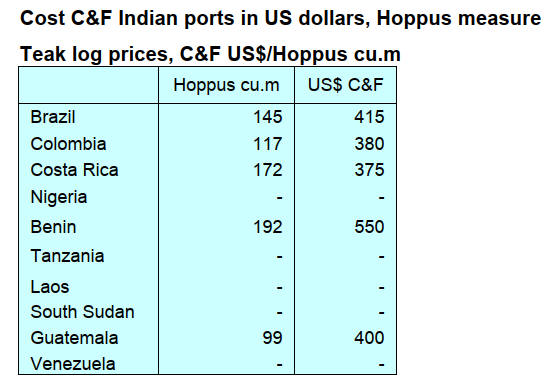
 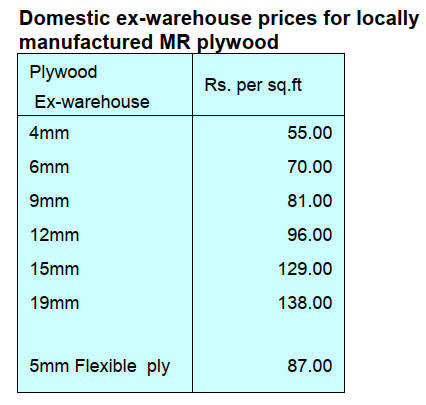
7.
VIETNAM
Wood and wood product (W&WP) trade highlights
Statistics from Vietnam’s General Department of Customs
show April 2024 W&WP exports reached US$1.36 billion,
up 5% compared to March 2024 and up 25% compared to
April 2023.
Of this, WP exports contributed US$938.7 million, up 6%
compared to March 2024 and up 20% compared to April
2023. Overall, in the first 4 months of 2024 W&WP
exports earned US$4.9 billion, up 25% over the same
period in 2023. In which, the WP exports, alone, earned
US$3.35 billion, up 28% over the same period in 2023.
Vietnam's W&WP exports to South Korea in April 2024
earned US$74 million, up 18% compared to April 2023.
Overall, in the first 4 months of 2024 W&WP exports to S.
Korea were valued at US$251 million, down 7% over the
same period in 2023.
The exports of living and dining room furniture in April
2024 earned US$230 million, up 16% compared to April
2023. In the first 4 months of 2024 exports of living and
dining room furniture were valued at US$833 million, up
31% over the same period in 2023.
Vietnam's W&WP imports in April 2024 were worth
US$232.8 million, up 20% compared to March 2024 and
up 38% compared to April 2023. In the first 4 months of
2024 imports of W&WP imports costed US$768.0 million,
up 21% over the same period in 2023.
Vietnam's oak imports in April 2024 stood at 41,600 cu.m,
worth US$24.7 million, up 20% in volume and 20% in
value compared to March 2024.
Compared to April 2023 imports of oak increased by
103% in volume and 106% in value. In the first 4 months
of 2024 imports of oak amounted to 108,600 cu.m, worth
US$63.3 million, up 50% in volume and 54% in value
over the same period in 2023.
Imports of logs and sawnwood (raw wood) from Southeast
Asia in April 2024 continued to increase reaching 80,000
cu.m with a value of US$24.0 million, up 4% in volume
and 9% in value compared to March 2024.
This brings the total volume of wood raw materials
imported from S.E. Asia in the first 4 months of 2024 to
289,170 cu.m with a value of US$83.67 million, up 15%
in volume and 13% in value over the same period in 2023.
Exports grow in the first five months of 2024
W&WP exports are estimated to have topped US$6 billion
in the first five months of this year, an increase of 18%
over the same period last year, according to General
Department of Customs.
Notably, WP exports earned over US$4 billion, up 7.5%
compared to the same period last year. With signals of
demand recovery worldwide Vietnamese companies are
investing in new technology and digital transformation to
develop new products and services and increase
competitiveness, efficiency and productivity.
However, Vietnam’s timber industries are also facing
many challenges especially in meeting demands for
verification of legality and origin (EUDR) and the Carbon
Border Adjustment Mechanism (CBAM), a carbon tariff
on carbon-intensive products imported to the European
Union.
See:
https://thoibaotaichinhvietnam.vn/vietnams-timber-wood-product-exports-post-positive-growth-in-the-first-five-months-151540.html
Vietnam and Japan cooperation on forestry
The Vietnam Administration of Forestry (VAF) and
Japan’s Forestry Agency have signed a memorandum of
cooperation (MoC on support for forestry).
At the signing ceremony on 14 May in Tokyo, VAF
Director, Tran Quang Bao, spoke highly of Japanese
cooperation and support for Vietnam in forestry over
recent years. Specifically, Japan helped Vietnam formulate
the 2017 Forestry Law and the decrees and circulars
guiding its implementation.
Through its official development assistance programmes,
Japan supported Vietnam to enhance sustainable forest
management, enhance forest-based livelihoods for the
community, protect biodiversity and cope with climate
change in forestry.
Japan’s programmes and projects implemented in Vietnam
have been assessed as contributing to the success of
Vietnam’s forestry sector in recent years. Despite having
recorded important results, Bao noted that the two sides
must further step up cooperation to promote both
countries’ potential and strengths. For his part, Aoyama
Toyohisa, Director-General for Technological Affairs,
Ministry of Agriculture, Forestry and Fisheries (MAFF)
spoke highly of Vietnam’s close coordination during the
cooperation process which resulted in important
achievements.
He asked both sides to work together to build a plan to
effectively implement the memorandum of cooperation.
The MoC includes co-operative activities on sustainable
forest management, climate change mitigation and
adaption, effective forest resource management and use,
forest, biodiversity conservation and forest landscape
restoration, forest management for natural disaster
prevention, research and development on new technology
in the field of forestry, human resource development,
timber legality and responsible trade of wood products.
See:
https://vietnamnews.vn/economy/1655589/viet-nam-japan-sign-moc-on-forestry-co-operation.html
Potential for US$200 million per year from carbon
credit trade
The Vietnamese Department of Forestry has estimated the
country could sell some 40 million carbon credits for a
revenue of US$200 million annually. Vietnam currently
has 14.79 million ha. of forest, a 42% forest cover.
The domestic media has reported the Department of
Forestry has signed an emissions reduction purchase
agreement with Emergent, a non-profit intermediary
engaging tropical countries and the private sector to
mobilise finance to support emissions reductions in
deforestation.
It is reported that Vietnam plans to transfer to the forest
financing organisation credits covering 5.15 million tonnes
of carbon up to 2026. The Ministry of Agriculture and
Rural Development has already identified targets and
solutions for forestry work this year with a focus on
completing the national forestry planning objectives.
See:
https://en.vietnamplus.vn/vietnam-capable-of-earning-200-million-usd-per-year-from-carbon-credit-trade-post280335.vnp
8. BRAZIL
African mahogany hub boosts
Minas Gerais economy
An African Mahogany Forestry Hub, located in Minas
Gerais State generates around R$25 million per year,
significantly contributing to the State economy.
According to the 2021 Brazilian Institute of Geography
and Statistics (IBGE), Minas Gerais is the leading State
for planted forests at 2.1 million hectares which include
plantations of African Mahogany.
The Brazilian Forestry Institute (IBF) said investment in
the Forestry Hub begins with the purchase of land offered
by the IBF which is responsible for the entire cycle of
planting, managing, and harvesting the trees.
The IBF also emphasises that cultivating African
mahogany is a long process requiring around 17 years
before harvest but it can yield financial returns exceeding
R$10 million for every 6 hectares planted. For investors,
planting African mahogany offers a way to diversify their
investments says IBF.
The search for long-term stability and future returns has
attracted investors from various regions in Brazil including
São Paulo, Rio de Janeiro, Paraná and Minas Gerais, a
testament to the potential of plantation forestry in Brazil.
See:
https://www.remade.com.br/noticias/19964/polo-florestal-movimenta-milhoes-na-economia-de-minas-gerais
Mato Grosso invests in strengthening traceability
With the expansion of areas designated for sustainable
forest management (SFM) in the State of Mato Grosso in
the Amazon Region, which currently extends to 5.0
million hectares, annual timber production can reach
around 7 million cubic metres. This is according to the
criteria established in environmental legislation that
ensures proof of origin, traceability and quality assurance.
The State Environmental Secretariat (SEMA) of Mato
Grosso has indicated there are opportunities to expand the
area under SFM to 7 million hectares thus ensuring the
conservation of natural resources and promoting socio-
economic development by generating employment and
income distribution in the region.
The forest sector in Mato Grosso has declared it is
committed to implementing a certification model that
provides greater security for the market in acquiring
timber products through compliance with the traceability
system of the chain of custody.
This involves mechanisms such as the System for the
Commercialisation and Transport of Forest Products
(Sisflora 2.0) and the Document of Forest Origin (DOF+
Traceability) which provide the means to track the native
timbers from the forest to the final consumer.
To expand the commercialisation of forest products and
increase the competitiveness of the timber industries in
Mato Grosso regulation ABNT PR 1020 (Recommended
Practice – Management of Natural Tropical Forest) came
into effect in April this year. This is a standard that
ensures sustainable forest management and establishes
procedures for obtaining certification, including a
certification seal of origin for the products.
See:
https://cipem.org.br/noticias/mato-grosso-trabalha-a-implementacao-da-certificacao-dos-produtos-madeireiros
Export update
In April 2024 Brazilian exports of wood-based products
(except pulp and paper) fell around 9% in value compared
to April 2023, from US$336.3 million to US$306.7
million.
Pine sawnwood exports decreased 18% in value between
April 2023 (US$59.5 million) and April 2024 (US$48.7
million). In volume, exports decreased 17% over the same
period, from 264,000 cu.m to 219,500 cu.m.
Tropical sawnwood exports decreased 17.6 % in volume,
from 29,000 cu.m in April 2023 to 23,900 cu.m in April
2024. In value, exports decreased 34.8 % from US$15.5
million to US$10.1 million, over the same period.
In contrast, pine plywood exports increased 15 % in value
in April 2024 (US$68.1 million) compared to April 2023
(US$59.4 million). In volume, exports increased 10 %
over the same period, from 179,900 cu.m (April 2023) to
197,700 cu.m. (April 2024).
As for tropical plywood, the volume of exports dropped
13% and in value the drop was 12%, from 3,000 cu.m and
US$1.7 million in April 2023 to 2,600 cu.m and US$1.5
million in April 2024, respectively.
The value of exports of wooden furniture decreased from
US$47.1 million in April 2023 to US$45.5 million in April
2024, a 3% fall.
International forest protection fund
An international effort is underway to establish a forest
protection fund aimed at preservation and valuing global
forest ecosystems. During the United Nations Forest
Forum meeting in New York, Brazil presented a proposal
"Tropical Forests Forever," receiving support from various
countries, including Ghana, Malaysia, the Democratic
Republic of Congo, Indonesia, Colombia, France, the
United Kingdom, the United Arab Emirates, the United
States and others.
The goal is to create a long-term financial fund to ‘reward’
countries that are reducing tropical deforestation through
providing resources for conservation of forests. The
Brazilian Forest Service (SFB) announced that all
developing countries with tropical forests that have
managed to reduce deforestation should be eligible to
receive a fixed payment per hectare of standing forest and
emphasised that the fund's launch is scheduled to take
place during the COP30 scheduled for 2025.
Additionally, the SFB highlighted Brazil's efforts in
combating deforestation reporting a 50% reduction in
deforestation in the Amazon over the past year. This, said
the SFB, was due to efforts to eliminate illegal activities.
The SFB also emphasised the importance of investment in
sustainable production activities highlighting the bio-
economy as an opportunity to increase the value of forests,
create jobs and income in the region and contribute to the
economy.
See:
https://news.un.org/pt/story/2024/05/1831421
Amazon+21 Institute fund for Amazon projects
The Amazon+21 Institute has launched an investment
platform, ‘The Sustainable Investments Facility’ with the
goal of attracting R$4 billion in funding for sustainable
projects in the Amazon over the next 10 years.
The platform, which operates through blended finance,
aims to initially raise R$600 million in the first three
years. With the support of the State Industrial Federations
in the Legal Amazon the institute intends to boost an
inclusive and high-value-added economy, reduce
deforestation, cut emissions and pollution and improve the
living conditions of the local population.
The ‘Sustainable Investments Facility’ will operate
through platforms focused on bioeconomy, renewable
energy, sustainable tourism, technical assistance,
multistakeholder engagement and knowledge generation.
See:
https://forestnews.com.br/instituto-amazonia21-fundo-projetos-sustentaveis/
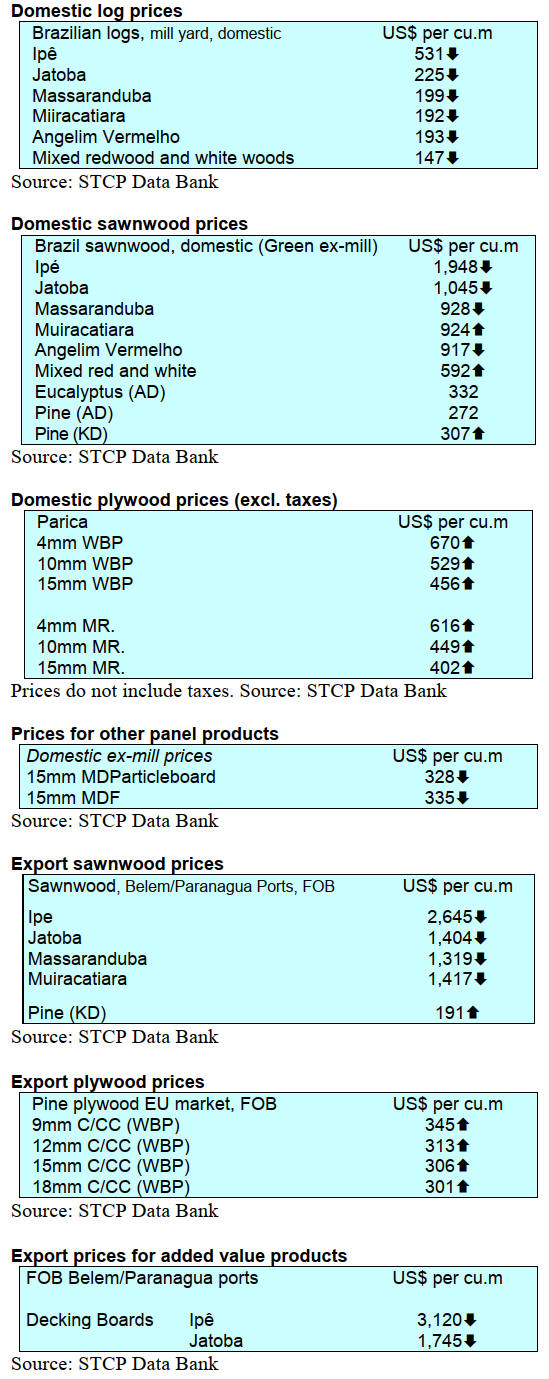
9. PERU
New Executive
Director for SERFOR
Engineer Nelly Paredes Del Castillo, the new Executive
Director (elect) of the National Forestry and Wildlife
Service (SERFOR) in the Ministry of Agrarian
Development and Irrigation (MIDAGRI) has said she will
work in an participatory manner with other sectors and
with the communities.
In her first presentation to SERFOR the staff she urged all
everyone to take on the challenge so that SERFOR
continues to shine and is able to attract more finance for its
activities.
Paredes Del Castillo was the head of the Technical
Cabinet of the Presidency of the Council of Ministers and
Minister of Agrarian Development and Irrigation. She was
also Director of Planning and Budget at MIDAGRI and a
Ddirector of Natural Resources, Risk and Climate Change
Management in the Rural Agrarian Productive
Development Programme (Agrorural).
See:
https://www.gob.pe/institucion/serfor/noticias/958900-trabajaremos-de-manera-articulada-entre-sectores-y-participativa-con-las-comunidades
Expert group discusses implementation of
agroforestry contracts
In a joint effort to promote the sustainable management of
Amazonian forests representatives of various entities met
in Pucallpa to form an inter-institutional technical group.
This initiative, led by the Regional Forestry and Wildlife
Management, is intended to prepare for the
implementation of the ‘Transfer in Use Contracts for
Agroforestry Systems’ (CCUSAF) in Ucayali.
During the meeting the importance of committing
financial, logistical and technical resources to guarantee
the success and effectiveness of the CCUSAF in Ucayali
was highlighted. The various stakeholders identified
activities and committed to working in a coordinated
manner to contribute to the process of granting and
implementing these contracts.
The meeting had technical assistance from the USAID
Forest+ project and the United States Forest Service. In
addition, representatives of the National Forestry and
Wildlife Service (Serfor), Agroideas, Sierra y Selva
Exportadora, Agrorural, the Regional Sectorial Directorate
of Agriculture, the Forest Resources Supervision Agency
(Osinfor). The National Commission for Development and
Life without Drugs (Devida) participated as did the
National Agrarian Health Service (Senasa) and the
National Institute of Agrarian Innovation.
Particleboard imports fall in first quarter
During the first quarter of 2024 imports of particleboard
(PB/MDP) reached a value of US$32.1 million which
representeds a significant decrease of 21% compared to
the same period in 2023 (US$40.9 millions).
Ecuador, as usual, remained the main supplier of PB/MDP
to the Peruvian market during this time with shipments
totaling US$17.2 million, marking a decrease of 10%
compared to 2023 (US$19.1 million). Ecuador's share of
Peru's total PB/MDP imports in the first quarter 2024 was
53%, compared to 47% during the first quarter of 2023.
Spain was the second supplier at US$5.5 million, a major
year on year decline. Brazil was the third largest supplier
in the period at US$4.9 million, surpassing Chile, which
was fourth with US$ 4.2 million.
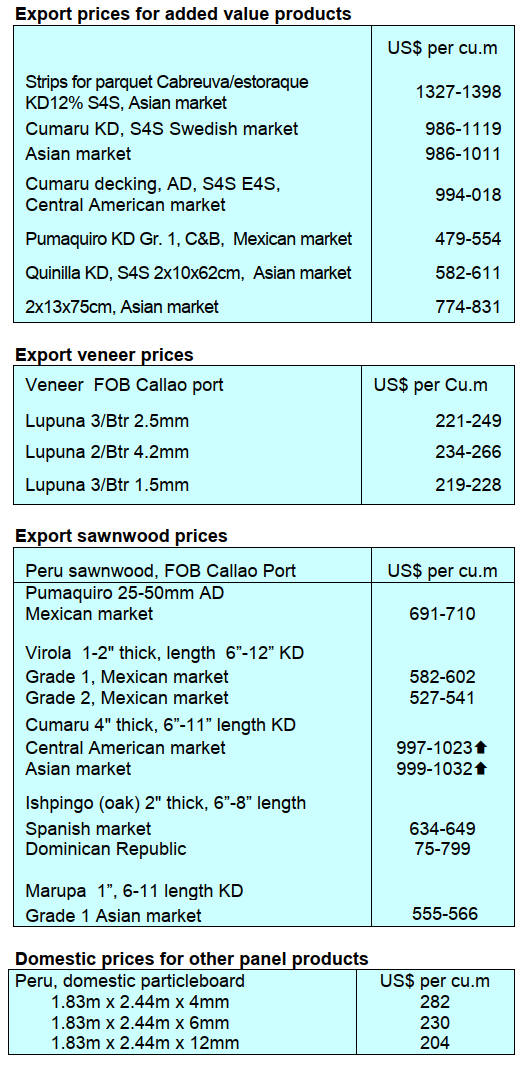
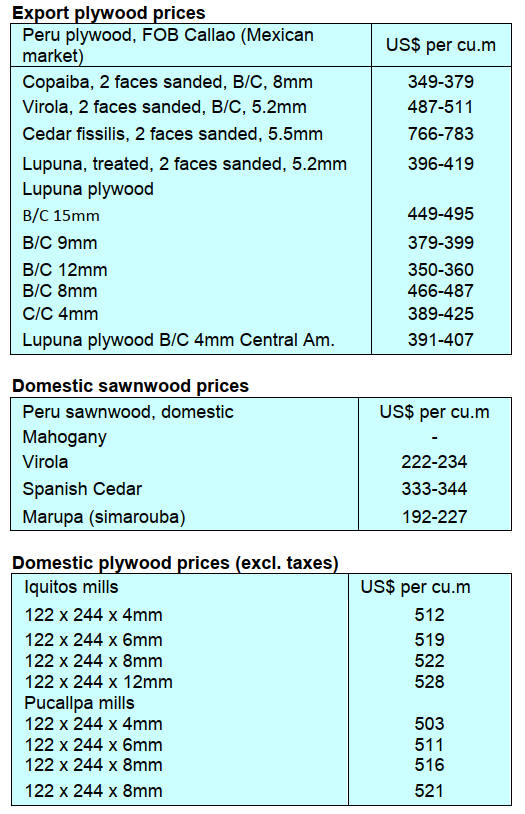
|